Monthly Archives: January 2021
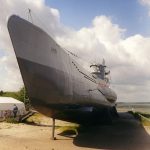 On January 31, 1917, at the height of World War I, Germany announced that they would renew the use of unrestricted submarine warfare in the Atlantic Ocean. The German torpedo-armed submarines, known as U-Boats, prepared to attack any and all ships operating in the Atlantic, including civilian passenger carriers, which were said to have been sighted in war-zone waters. They were prepared to attack without a second thought, whether they were innocent civilians or not. Unleashing the U-Boats was almost like unleashing terrorists, because the U-Boats were an invisible enemy. Yes, the could be seen, but beneath the surface of the water, they could easily hide in the murky darkness, unleashing their torpedoes to go streaking through the water. The first sign of danger was when the doomed ship watchmen saw the dreaded white streak coming at them through the water. There was no time to take evasive action. The ship could not move that fast, and it could not turn on a dime. They were sitting ducks.
On January 31, 1917, at the height of World War I, Germany announced that they would renew the use of unrestricted submarine warfare in the Atlantic Ocean. The German torpedo-armed submarines, known as U-Boats, prepared to attack any and all ships operating in the Atlantic, including civilian passenger carriers, which were said to have been sighted in war-zone waters. They were prepared to attack without a second thought, whether they were innocent civilians or not. Unleashing the U-Boats was almost like unleashing terrorists, because the U-Boats were an invisible enemy. Yes, the could be seen, but beneath the surface of the water, they could easily hide in the murky darkness, unleashing their torpedoes to go streaking through the water. The first sign of danger was when the doomed ship watchmen saw the dreaded white streak coming at them through the water. There was no time to take evasive action. The ship could not move that fast, and it could not turn on a dime. They were sitting ducks.
The vast majority of people of the United States favored neutrality when it came to World War I. So when the war erupted in 1914, President Woodrow Wilson pledged the stay neutral. The problem was that Britain was one of America’s closest trading partners. That created serious tension between the United States and Germany, when Germany attempted a blockade of the British isles. Several US ships traveling to Britain were damaged or sunk by German mines and, in February 1915, Germany announced unrestricted warfare against all ships, neutral or otherwise, that entered the war zone around Britain. One month later, Germany announced that a German cruiser had sunk the William P. Frye, a private American merchant vessel that was transporting grain to England when it disappeared. President Wilson was outraged, but the German government apologized, calling the attack an unfortunate mistake. That didn’t stop their reign of terror, however. In November they sank an Italian liner without warning, killing 272 people, including 27 Americans. Public opinion concerning the war, and the stand of the United States in it began to change. It was time for the United States to get into World War I.
The Germans were far in advance of other nations when it came to submarines. The U-boat was 214 feet long, carried 35 men and 12 torpedoes, and could travel underwater for two hours at a time. In the first few years of World War I, the U-boats took a terrible toll on Allied shipping. In early May 1915, several New York newspapers had to publish a warning by the German embassy in Washington that Americans traveling on British or Allied ships in war zones did so at their own risk. The announcement was placed on the same page as an advertisement for the imminent sailing of the British-owned Lusitania ocean liner from New York to Liverpool. I’m sure they had hoped that people would heed the warning, but many people boarding the Lusitania either didn’t take notice of the warning or they didn’t see it. On May 7, the Lusitania was torpedoed without warning just off the coast of Ireland. Of the 1,959 passengers, 1,198 were killed, including 128 Americans. The Germans had proven once again that they were ruthless and conniving. Following the sinking of the Lusitania The German government accused the Lusitania was carrying munitions. The US demanded an end to German attacks on unarmed passenger and merchant ships, and full repayment for the loss.
Following the sinking of the Lusitania the German government accused the Lusitania was carrying munitions. The US demanded an end to German attacks on unarmed passenger and merchant ships, and full repayment for the loss. Germany countered with a pledge to see to the safety of passengers before sinking unarmed vessels in August 1915. All that changed by January 1917, when Germany, determined to win its war of attrition against the Allies, announced the resumption of unrestricted warfare. Three days later, the United States broke off diplomatic relations with Germany, who, just hours later sunk the American liner Housatonic. None of the 25 Americans on board were killed and they were picked up by a British steamer.
On February 22, Congress passed a $250 million arms-appropriations bill intended to ready the United States for war. British authorities gave the US ambassador to Britain a copy of what has become known as the “Zimmermann Note,” a coded message from German Foreign Secretary Arthur Zimmermann to Count Johann von Bernstorff, the German ambassador to Mexico. In the telegram, intercepted and deciphered by British intelligence, Zimmermann stated that, in the event of war with the United States, Mexico should be asked to 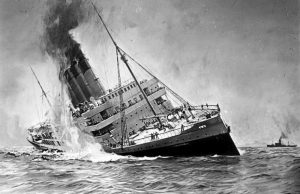 enter the conflict as a German ally. In return, Germany would promise to restore to Mexico the lost territories of Texas, New Mexico and Arizona. On March 1, the outraged US State Department published the note and America was galvanized against Germany once and for all. In late March, Germany sank four more US merchant ships. President Wilson appeared before Congress and called for a declaration of war against Germany on April 2nd. On April 4th, the Senate voted 82 to six to declare war against Germany. Two days later, the House of Representatives endorsed the declaration by a vote of 373 to 50 and America formally entered World War I. They were after that invisible enemy, and they were determined to find it and destroy it.
enter the conflict as a German ally. In return, Germany would promise to restore to Mexico the lost territories of Texas, New Mexico and Arizona. On March 1, the outraged US State Department published the note and America was galvanized against Germany once and for all. In late March, Germany sank four more US merchant ships. President Wilson appeared before Congress and called for a declaration of war against Germany on April 2nd. On April 4th, the Senate voted 82 to six to declare war against Germany. Two days later, the House of Representatives endorsed the declaration by a vote of 373 to 50 and America formally entered World War I. They were after that invisible enemy, and they were determined to find it and destroy it.


 My nephew, Chris Iverson is an avid outdoorsman. He loves camping, fishing, and guns. That is pretty typical of people who live in Wyoming. If Chris and my niece, Cassie could live totally off the grid, I think they would, and if the someday move off the grid, I won’t be one bit surprised. Sometimes, living in town just gets to bee too much for them, and they will load up their camper trailer, and head for the mountains. It is wonderful for their kids, Lucas and Zoey too. They love being in the mountains, especially with family and friends.
My nephew, Chris Iverson is an avid outdoorsman. He loves camping, fishing, and guns. That is pretty typical of people who live in Wyoming. If Chris and my niece, Cassie could live totally off the grid, I think they would, and if the someday move off the grid, I won’t be one bit surprised. Sometimes, living in town just gets to bee too much for them, and they will load up their camper trailer, and head for the mountains. It is wonderful for their kids, Lucas and Zoey too. They love being in the mountains, especially with family and friends.
When Chris and Cassie had Lucas, there were some challenges. Lucas was born with Down Syndrome, and many parents would have considered other possible avenues of dealing with a known birth defect, but for Chris 
 and Cassie, that was not an option. Lucas with their precious baby, and he was who he was. They loved him and cherished him, and he has grown into a wonderful little boy. Chris and Cassie, are great parents, and they have trained both of their children to be wonderful, caring children who love and respect their siblings
and Cassie, that was not an option. Lucas with their precious baby, and he was who he was. They loved him and cherished him, and he has grown into a wonderful little boy. Chris and Cassie, are great parents, and they have trained both of their children to be wonderful, caring children who love and respect their siblings
Chris loves his family with all his heart, and always tries to do whatever he can to life better for them. He has the ability to fix his cars, so that saves him money, that can be better used in support of his family. Life isn’t always easy for the Iverson family. Medical bills have plagued them from time to time, but they have continued to persevere, and I know they will do so in the future. Today is Chris’ birthday. Happy birthday Chris!! Have a great day!! We love you!!
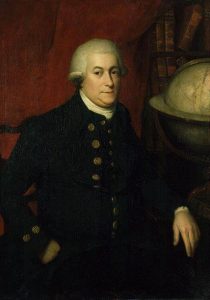 Captain George Vancouver, a British Officer, commanded the HMS Discovery and its accompanying ships on an exploratory voyage of the Pacific Northwest, between the years of 1791 and 1794. Vancouver and his crew were privileged to be the first to see places like Mount Saint Helens and the first to explore the Puget Sound. Their goal was to explore every bay and outlet in the region…following the coasts of Oregon and Washington. Men were sent in smaller boats to explore the Columbia River and enter the strait of Juan de Fuca.
Captain George Vancouver, a British Officer, commanded the HMS Discovery and its accompanying ships on an exploratory voyage of the Pacific Northwest, between the years of 1791 and 1794. Vancouver and his crew were privileged to be the first to see places like Mount Saint Helens and the first to explore the Puget Sound. Their goal was to explore every bay and outlet in the region…following the coasts of Oregon and Washington. Men were sent in smaller boats to explore the Columbia River and enter the strait of Juan de Fuca.
The larger ships, including the Chatham…the Armed Tender of the HMS Discovery, often anchored in the safe harbors, while the smaller vessels explored the many channels and rivers along the coast. On April 29, 1792, the ships entered the Straits of Juan de Fuca and anchored in the calm waters of Discovery Bay. While the ships stayed in the bay…using it as a base, Vancouver and his men explored the waters of Admiralty Inlet and Hood Canal. After several weeks of exploring, the Chatham began to sail north across the Straits of Juan de Fuca to explore the San Juan and Lopez Islands. After successfully exploring the islands, the Chatham sailed southward in May to rejoin the HMS Discovery and continue their explorations south. They moved the explorations south, as far as Commencement Bay in Tacoma, before turning around and returning north, where they hoped that the waters were going to be safer.
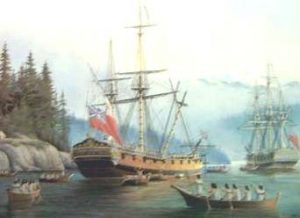 When the ships arrived at the Puget Sound, a storm was raging, accompanied by severe currents and tides. While crossing an unknown channel, the Chatham was caught by a flood tide and swept away helpless. In an effort to slow her progress, the crew dropped her stream anchor. Unfortunately, the strain was too much and the cable snapped. Amazingly, the Chatham survived, but the sweep of the waters did not locate the lost anchor, so the ship rejoined the HMS Discovery.
When the ships arrived at the Puget Sound, a storm was raging, accompanied by severe currents and tides. While crossing an unknown channel, the Chatham was caught by a flood tide and swept away helpless. In an effort to slow her progress, the crew dropped her stream anchor. Unfortunately, the strain was too much and the cable snapped. Amazingly, the Chatham survived, but the sweep of the waters did not locate the lost anchor, so the ship rejoined the HMS Discovery.
Vancouver’s journal entry for June 9, 1792 read, “We found tides here extremely rapid, and on the 9th in endeavoring to get around a point to the Bellingham Bay we were swept leeward of it with great impetuosity. We let go the anchor in 20 fathoms but in bringing it up such was the force of the tide that we parted the cable. At slack water we swept for the anchor but could not get it. After several fruitless attempts, we were at last obliged to leave it.”
These days, the anchor would be a treasure of great value, which motivated a company called Anchor Ventures,  LLC of Seattle to initiate a search of not the Cannel, but rather off Whidbey Island’s northwestern shore. Their bet that the Chatham wasn’t with the Discovery at the time of the storm apparently paid off. Anchor Ventures pulled up what they believe to be the long lost anchor in 2014. Since then, the team has been trying to prove its identity. Skeptics aren’t so sure that this is the right anchor, because they say it is heavier than those of the late 1700s. That said, the question remains. Is the anchor still there, or did they jump to conclusions. It’s hard to say, and proof will be tough to find. I think it is not likely that they found the right anchor…especially looking in the wrong place.
LLC of Seattle to initiate a search of not the Cannel, but rather off Whidbey Island’s northwestern shore. Their bet that the Chatham wasn’t with the Discovery at the time of the storm apparently paid off. Anchor Ventures pulled up what they believe to be the long lost anchor in 2014. Since then, the team has been trying to prove its identity. Skeptics aren’t so sure that this is the right anchor, because they say it is heavier than those of the late 1700s. That said, the question remains. Is the anchor still there, or did they jump to conclusions. It’s hard to say, and proof will be tough to find. I think it is not likely that they found the right anchor…especially looking in the wrong place.
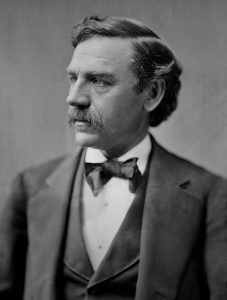 As is common with ships, the William P. Frye was a four-masted steel barque named after a US Republican politician of the same name, from the state of Maine. The ship was built by Arthur Sewall and Co of Bath, Maine in 1901. For a time, the ship had a great run…until 1915, that is. The ship sailed from Seattle, Washington on November 4, 1914, with a cargo of 189,950 US bushels of wheat. The ship and its cargo were bound for Queenstown, Falmouth, or Plymouth in the United Kingdom. In 1915 the United Kingdom was at war with Imperial Germany, but the United States was not enter the war yet and was officially neutral. It was early in the war, but that doesn’t make it any less dangerous to sail the high seas.
As is common with ships, the William P. Frye was a four-masted steel barque named after a US Republican politician of the same name, from the state of Maine. The ship was built by Arthur Sewall and Co of Bath, Maine in 1901. For a time, the ship had a great run…until 1915, that is. The ship sailed from Seattle, Washington on November 4, 1914, with a cargo of 189,950 US bushels of wheat. The ship and its cargo were bound for Queenstown, Falmouth, or Plymouth in the United Kingdom. In 1915 the United Kingdom was at war with Imperial Germany, but the United States was not enter the war yet and was officially neutral. It was early in the war, but that doesn’t make it any less dangerous to sail the high seas.
When the ship was near the coast of Brazil, the Imperial German Navy raider SMS Prinz Eitel Friedrich overtook the William P. Frye on January 27, 1915. The Germans stopped and boarded the ship. I can’t imagine what it must have been like to have an enemy navy detain a ship I was on. You just never know what they are going to do. The William P. Frye was owned by the United States, and so a neutral ship. The ship should have been treated 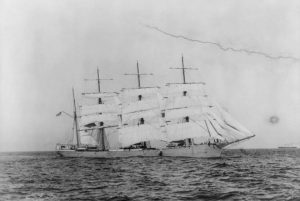 as neutral. The problem the William P. Frye had is that the cargo was deemed a legitimate war target because the Germans believed it was bound for Britain’s armed forces. In reality, even detaining the ship was probably an act of war, but that never seemed to bother the Germans anyway.
as neutral. The problem the William P. Frye had is that the cargo was deemed a legitimate war target because the Germans believed it was bound for Britain’s armed forces. In reality, even detaining the ship was probably an act of war, but that never seemed to bother the Germans anyway.
Upon making his decision that the William P. Frye was a legitimate target, the captain of SMS Prinz Eitel Friedrich, Max Thierichens, ordered that William P. Frye’s cargo of wheat be thrown overboard. The captain and crew began to comply, most likely begrudgingly, and when the orders were not followed fast enough, he took the ship’s crew and passengers prisoner. Then he ordered the ship scuttled on January 28, 1915. The William P. Frye was the first American vessel sunk during World War I, and the United States wasn’t even in the war yet. The 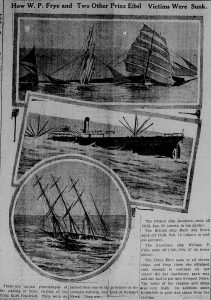 owners of the ship, Arthur Sewall and Co, wanted damages for the sinking of the ship and presented a claim for $228,059.54, which would total $5,763,800 today. In all, the SMS Prinz Eitel Friedrich scuttled eleven ships during their reign of terror. They stole coal and gold from their victims, which kept them going for a while, until they developed engine trouble.
owners of the ship, Arthur Sewall and Co, wanted damages for the sinking of the ship and presented a claim for $228,059.54, which would total $5,763,800 today. In all, the SMS Prinz Eitel Friedrich scuttled eleven ships during their reign of terror. They stole coal and gold from their victims, which kept them going for a while, until they developed engine trouble.
In another act of war, Thierichens took the passengers and the crew captive. Women and children, were part of approximately 350 people taken prisoner from eleven different ships that SMS Prinz Eitel Friedrich’s crew had searched and destroyed. I suppose the possible act of war was somewhat forgiven when all 350 were released on March 10, 1915, when the German raider had engine trouble, and docked Newport News, Virginia, but then again, what else could they do with them. Nevertheless, an outraged American government forced the Germans to apologize for the sinking, and of course, the SMS Prinz Eitel Friedrich was detained in port.

 My niece, Lacey Stevens is a super successful cosmetologist. She is probably the youngest store manager for Ulta Beauty, as well as their top seller and earns a good amount of money in commissions. If you want an appointment with Lacey, you had better plan ahead. Lacey is booked out a month or more for hair and makeup. Lacey is a role model for all of the employees in the salon and store, and they come to her for advice on what products to use for which hair problem or facial problem or for make up tips. Of course, one look at her and you can see why. Lacey is an expert a both hair and makeup. She always looks stunning…model quality. She always looks the part of a beautiful woman that people want to copy. She is the epitome of success and beauty.
My niece, Lacey Stevens is a super successful cosmetologist. She is probably the youngest store manager for Ulta Beauty, as well as their top seller and earns a good amount of money in commissions. If you want an appointment with Lacey, you had better plan ahead. Lacey is booked out a month or more for hair and makeup. Lacey is a role model for all of the employees in the salon and store, and they come to her for advice on what products to use for which hair problem or facial problem or for make up tips. Of course, one look at her and you can see why. Lacey is an expert a both hair and makeup. She always looks stunning…model quality. She always looks the part of a beautiful woman that people want to copy. She is the epitome of success and beauty.

Lacey has been in a relationship with Chris Killinger for about a year and a half now, and he brought with him the blessing of his two children, Brooklyn and Jaxon. The kids have been a great addition to the family, and Lacey’s niece, Elliott loves them very much, as does the rest of the family. Brooklyn loves to sit at Lacey’s vanity table and watch her do her makeup. She find that process intriguing. Lacey is so good with her, and sometimes she puts a little makeup on Brooklyn. Every little girl needs that, I say, and what better person to help Brooklyn with a little dress-up, than Lacey. She has been a blessing to Chris and to his kids, just as they have been to her.
Lacey’s family loves to spend time at the lake in the summer. Pathfinder Reservoir is their favorite place to go. She and Chris took the kids there for the annual summer gathering, and everyone had an absolute blast. Children 
 always add a special touch to any family gathering. Brooklyn and Jaxon are no exception. Life’s journey always has its twists and turns, but the turn that let Lacey to meet Chris is considered a wonderful one. Lacey is so happy, and that, in my book, makes Chris a great guy. We will see where the future leads them, but for now, they are just enjoying the time together. It is the same in much of Lacey’s life. Things are going so well, and Lacey is very happy and content….just enjoying the ride. Today is Lacey’s birthday. Happy birthday Lacey!! Have a great day!! We love you!!
always add a special touch to any family gathering. Brooklyn and Jaxon are no exception. Life’s journey always has its twists and turns, but the turn that let Lacey to meet Chris is considered a wonderful one. Lacey is so happy, and that, in my book, makes Chris a great guy. We will see where the future leads them, but for now, they are just enjoying the time together. It is the same in much of Lacey’s life. Things are going so well, and Lacey is very happy and content….just enjoying the ride. Today is Lacey’s birthday. Happy birthday Lacey!! Have a great day!! We love you!!

 My husband’s aunt, Margee Kountz raised her children as a single mom for most of their lives. She was there for them in every way. From early childhood, through the school years, and beyond. She has been a hands-on mom, grandma, and great grandma. As we all know, life isn’t always a bed of roses. It has it’s ups and downs, and especially for kids, we need to help them get through all of it. Margee was very supportive of her family, and took them through most of life’s sad times, and well as celebrating the good times.
My husband’s aunt, Margee Kountz raised her children as a single mom for most of their lives. She was there for them in every way. From early childhood, through the school years, and beyond. She has been a hands-on mom, grandma, and great grandma. As we all know, life isn’t always a bed of roses. It has it’s ups and downs, and especially for kids, we need to help them get through all of it. Margee was very supportive of her family, and took them through most of life’s sad times, and well as celebrating the good times.
I think that one of the greatest joys of Margee’s life was the time she got to spend with her grandchildren. Part of that time was spent helping to raise her son, Dan’s two children, Zech and Staci Kountz, who lost their mother at an early age to cancer. They needed her…all three of them, and she was there for them. To be there for someone like that, even your own child, takes strength…incredible strength. Margee has carried her kids through good times and bad times. It’s what a great mom does, and Margee is a great mom.
Margee is the youngest of her parents, Bob and Nettie Knox, kids, and the last one left now. She was a great 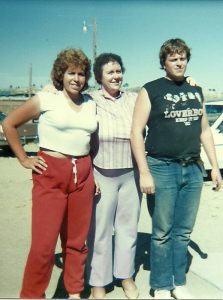
 sister to Joanne Schulenberg and Linda Cole. While she couldn’t always go see them, she did her best to stay in touch. She saw Joann mere, because she was in a nursing home here in Casper, but Linda lived far away, so it was hard. Nevertheless, Margee loved her sisters dearly, and they loved her. I remember so many years in the past and some of the great gatherings we all had. Margee had learned cake decorating, and often made the birthday cakes for our celebrations. They were beautiful. I miss those gatherings. We had such a great time when we all got together. The family is spread around some, and of course, we get busier by the day, but in my memory files, I still see this family, all together and having a great time. Today is Margee’s 72nd birthday. Happy birthday Margee!! Have a great day!! We love you!!
sister to Joanne Schulenberg and Linda Cole. While she couldn’t always go see them, she did her best to stay in touch. She saw Joann mere, because she was in a nursing home here in Casper, but Linda lived far away, so it was hard. Nevertheless, Margee loved her sisters dearly, and they loved her. I remember so many years in the past and some of the great gatherings we all had. Margee had learned cake decorating, and often made the birthday cakes for our celebrations. They were beautiful. I miss those gatherings. We had such a great time when we all got together. The family is spread around some, and of course, we get busier by the day, but in my memory files, I still see this family, all together and having a great time. Today is Margee’s 72nd birthday. Happy birthday Margee!! Have a great day!! We love you!!
 My husband’s uncle, Bobby Cole was a man who liked things to run on a slow, easy pace. That might be why he and his family moved the the dinky town of Kennebec, South Dakota. Bobby’s family was from that area, so it was an area he was comfortable with, and his family all agreed that it felt like home. Growing up in central South Dakota, Bobby liked the country lifestyle, and never really wanted to be anywhere else, even though they moved to Winnemucca, Nevada after a lightning fire destroyed their hotel, taking with it their income. That was a tough time for them. They had a life in Kennebec. They square danced, and socialized with friends. Nevertheless, they made the move to Winnemucca and settled into the area.
My husband’s uncle, Bobby Cole was a man who liked things to run on a slow, easy pace. That might be why he and his family moved the the dinky town of Kennebec, South Dakota. Bobby’s family was from that area, so it was an area he was comfortable with, and his family all agreed that it felt like home. Growing up in central South Dakota, Bobby liked the country lifestyle, and never really wanted to be anywhere else, even though they moved to Winnemucca, Nevada after a lightning fire destroyed their hotel, taking with it their income. That was a tough time for them. They had a life in Kennebec. They square danced, and socialized with friends. Nevertheless, they made the move to Winnemucca and settled into the area.

Both Bobby and Linda got jobs at the local casinos, and found that they enjoyed their lives there. Winnemucca was a very different place than Kennebec, but they liked the new social side of it. There was always new people to see and meet, and the gambling was fun for them. Like most people, they probably gambled more at first, but after a while, it becomes a normal part of life, and you end up doing it less. For most people, gambling…giving your money away to the casinos gets old, and you do it much less. Whenever we visited, they might play Keno a couple of times, but they would rather be at their house outside  of town, visiting with us than hanging out in the casinos.
of town, visiting with us than hanging out in the casinos.
Bobby and Linda were always fun people to be around, and we enjoyed the visits we made to their home both in Kennebec and Winnemucca. I’m so glad that we took the time to really get to know Bobby, Linda, and their kids, Sheila and Pat. We always felt like we had been a blessing to them, as they were to us. All too soon, Bobby left us, following a courageous battle with cancer on May 30, 2014, while seeking treatment in Colorado Springs, Colorado, Today would have been Bobby’s 78th birthday. Happy birthday in Heaven, Bobby. We love and miss you very much.
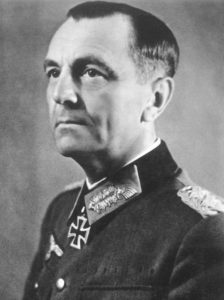
 As the Third Reich was losing its war against the world, German General Friedrich Paulus, who was commander in chief of the German 6th Army at Stalingrad, urgently requests permission from Adolf Hitler to surrender his position there. Paulus knew they had no chance, but Hitler refused. Of course, we all know that Hitler was insane. He would make his men fight to the death when there was no hope of winning the battle.
As the Third Reich was losing its war against the world, German General Friedrich Paulus, who was commander in chief of the German 6th Army at Stalingrad, urgently requests permission from Adolf Hitler to surrender his position there. Paulus knew they had no chance, but Hitler refused. Of course, we all know that Hitler was insane. He would make his men fight to the death when there was no hope of winning the battle.
Stalingrad was a prized strategic area, and the battle to take the city began in the summer of 1942. German forces assaulted the city, which was a major industrial center, but they had misjudged the Soviets. Despite repeated attempts and having pushed the Soviets almost to the Volga River in mid-October, as well as encircling Stalingrad, the 6th Army, under Paulus, and part of the 4th Panzer Army could not break past the adamantine defense of the Soviet 62nd Army. As their resources diminished. The Germans suffered diminishing resources, partisan guerilla attacks, and the cruelty of the Russian winter, all of which began to take their toll on the Germans. The Soviets made their move on November 19, launching a counteroffensive that began with a massive artillery bombardment of the German position. The assault began when the Soviets attacked the weakest link in the German force-inexperienced Romanian troops. Soviet soldiers took 65,000 soldiers prisoner that day. Then, the Soviets in a bold strategic move, encircled the enemy and launched pincer movements from north and south simultaneously, just as the Germans were encircling Stalingrad. It was at this point that the Germans should have withdrawn, and Paulus requested permission to withdraw, but Hitler wouldn’t allow it. He told his armies to hold out until they could be reinforced. Fresh troops would not arrive until December, and by then it was too late. The Soviet position was too strong, and the Germans were exhausted. They were out of options.
By January 24, the Soviets had overrun Paulus’ last airfield. His position was indefensible and surrender was the only hope for survival. Paulus urgently requested, “Let us surrender!!” Still, Hitler wouldn’t hear of it: “The 6th Army will hold its positions to the last man and the last round.” Paulus held out until January 31, when he finally surrendered. Of more than 280,000 men under Paulus’ command, half were already dead or dying, 
 about 35,000 had been evacuated from the front, and the remaining 91,000 were hauled off to Soviet POW camps. Paulus eventually sold out to the Soviets altogether, joining the National Committee for Free Germany and urging German troops to surrender. Testifying at Nuremberg for the Soviets, he was released and spent the rest of his life in East Germany. Hitler was crazy, and his officers knew it, but there was little they could do about it.
about 35,000 had been evacuated from the front, and the remaining 91,000 were hauled off to Soviet POW camps. Paulus eventually sold out to the Soviets altogether, joining the National Committee for Free Germany and urging German troops to surrender. Testifying at Nuremberg for the Soviets, he was released and spent the rest of his life in East Germany. Hitler was crazy, and his officers knew it, but there was little they could do about it.
 Most of us realize that there are earthquakes going on all the time. Most of them are very small, and often not even felt by anyone. Some are so far out in the ocean that they have little effect of anything. Others are far out in the wilderness or unpopulated areas, and so no one feels them. There are, however, some that are so large and so devastating, that they can never be forgotten. The January 23, 1556 earthquake in Shaanxi, China is just such an earthquake.
Most of us realize that there are earthquakes going on all the time. Most of them are very small, and often not even felt by anyone. Some are so far out in the ocean that they have little effect of anything. Others are far out in the wilderness or unpopulated areas, and so no one feels them. There are, however, some that are so large and so devastating, that they can never be forgotten. The January 23, 1556 earthquake in Shaanxi, China is just such an earthquake.
The earthquake struck Shaanxi late in the evening, and the aftershocks continuing through the following morning. I’m not sure how the scientists can calculate the magnitude years later, but their investigation revealed that the magnitude of the quake was approximately 8.0 to 8.3. That is, by no means, the strongest quake on record, but it struck right in the middle of a densely populated area with poorly constructed buildings and homes, resulting in a horrific death toll. Making buildings earthquake proof in the 1500s was not even a possibility…at least not to the level of the current building codes. Because of that, the death toll was estimated at a staggering 830,000 people. Of course, counting casualties is often imprecise after large-scale disasters, especially prior to the 20th century. Nevertheless, this disaster is still considered the deadliest of all time.
The earthquake’s epicenter was in the Wei River Valley in the Shaanxi Province, near the cities of Huaxian,  Weinan and Huayin. In Huaxian alone, every single building and home collapsed, killing more than half the residents of the city. The death toll there was estimated in the tens of thousands. Similarly, the death toll and economic impact in Weinan and Huayin was also very high. There were places where 60-foot-deep crevices opened in the earth. Serious destruction and death occurred as much as 300 miles away from the epicenter. The earthquake triggered landslides, which also contributed to the massive death toll. Of course, the estimates could be off, but even if the number of deaths caused by the Shaanxi earthquake has been overestimated slightly, it would still rank as the worst disaster in history by a considerable margin.
Weinan and Huayin. In Huaxian alone, every single building and home collapsed, killing more than half the residents of the city. The death toll there was estimated in the tens of thousands. Similarly, the death toll and economic impact in Weinan and Huayin was also very high. There were places where 60-foot-deep crevices opened in the earth. Serious destruction and death occurred as much as 300 miles away from the epicenter. The earthquake triggered landslides, which also contributed to the massive death toll. Of course, the estimates could be off, but even if the number of deaths caused by the Shaanxi earthquake has been overestimated slightly, it would still rank as the worst disaster in history by a considerable margin.


